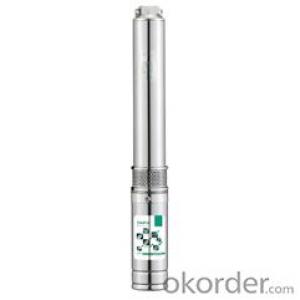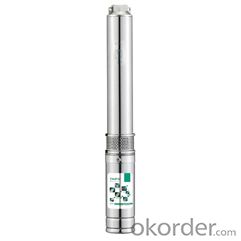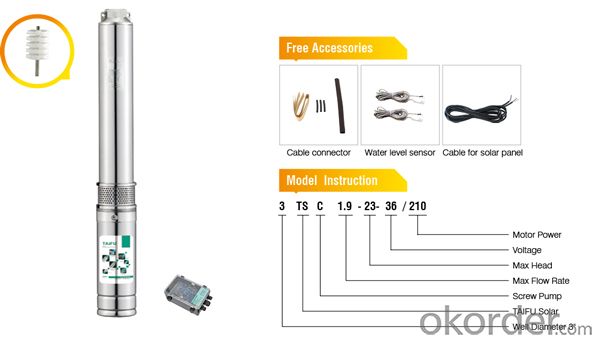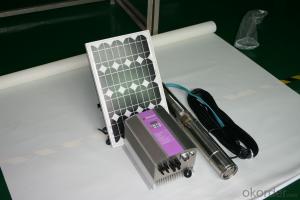Handuro Solar Pump 3tsc/4tsc Stainless Steel CE Solar Panel
- Loading Port:
- Shanghai
- Payment Terms:
- TT OR LC
- Min Order Qty:
- 50 pc
- Supply Capability:
- 100000 pc/month
OKorder Service Pledge
OKorder Financial Service
You Might Also Like
1.APPLICATION AREA:This project products are mainly used in dry region for irrigation of agriculture, It can be used for drinking water and
living water. The living condition could be much improved. It also can be used for fountains.2.MATERIAL OF PARTS:Outlet: stainless steel
Pump body: stainless steel
Motor body: stainless steel
Bearing: C&U
3.ADVANCED TECHNOLOGY:1.Application innovation
Compared with the traditional alternating current machine, the efficiency is improved 25% by the permanent magnetism, direct current, brushless, non-sensor motor.
2.Technics innovation
Adopt double plastic package for rotor and stator, motor insulation≥300MΩ, the motor security was much improved.
3.Structure innovation
Oil filling, convenient installation and environmental protection4.HIGHLIGHTSa.Energy-saving and environment-protected green products
b.High technique products adopting MPPT and DSP chip technique.
c.100% copper wire, cold-rolled silicon steel sheet
d.CE certificate
e.Advanced three phase brushless DC motor
f.Stainless steel 316 screws
g.3 years warranty5.PRINCIPLE OF OPERATION:Solar panel collects sunlight→DC electricity energy → solar controller(rectification,stabilization,amplification,filtering)→available DC electricity→(charge the batteries)→pumping water6.ADVANTAGES OF SOLAR PUMP SYSTEM:A.It is easier and more widely used than any other dynamoelectric driven pumps.
B.It is more economical and more environmentally friendly.7.MODEL SELECTION:a.The power of solar panel = power of pump ×1.3
The voltage of solar panel = the voltage of pump
The controller should be matched
b.Select the batteries according to the following formulas:
The use hour of battery =
The battery capacity ÷(the machine power÷the battery voltage)×0.6 For example,the machine power is 200W, the battery
capacity is 100AH,the voltage is 12V,and the battery is fully charged,then the use hour is:100÷(200÷12)×0.6=3.6hours
c.The battery capacity=
the use hour ÷0.6×(the machine power÷the battery voltage) For example,the machine power is 200W,the battery voltage
is 12V,and the battery need to be used for 3.6hours,then the battery capacity is:3.6÷0.6×(200÷12)=100AH

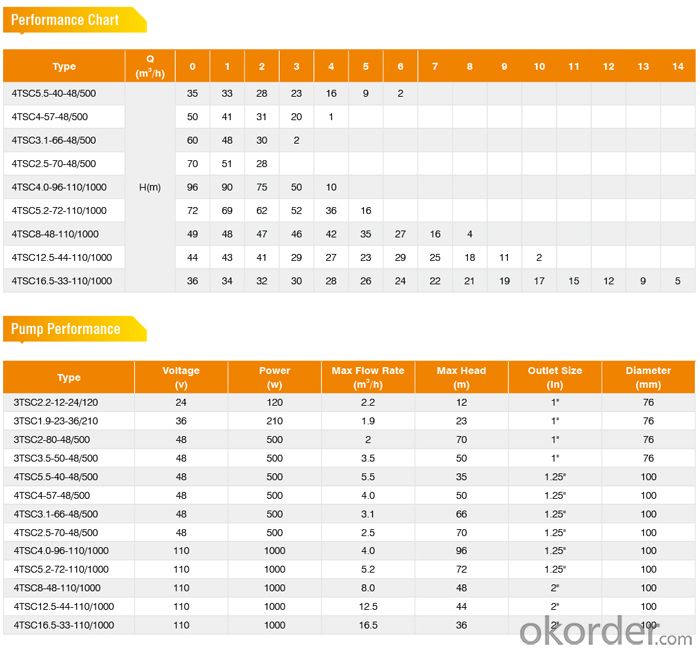
- Q: Can a solar pump be used for fountains?
- Yes, a solar pump can be used for fountains. Solar pumps are designed to run on solar energy, making them an eco-friendly and cost-effective solution for powering fountains. They can provide a reliable source of water circulation and create beautiful water displays without the need for electricity or batteries.
- Q: Can solar pumps be used for geothermal heating or cooling systems?
- No, solar pumps are not typically used for geothermal heating or cooling systems. Geothermal systems rely on the natural heat stored in the ground, while solar pumps are designed to utilize solar energy for pumping water or other fluids. Geothermal systems typically involve specialized equipment and technologies specifically designed for geothermal applications.
- Q: Do solar pumps require any additional equipment?
- Yes, solar pumps generally require additional equipment such as solar panels, a controller, a battery or storage system, and sometimes a converter or inverter to convert the direct current (DC) generated by the solar panels into alternating current (AC) for pumping.
- Q: What is the impact of a solar pump on rural development?
- A solar pump has a significant impact on rural development. It provides access to clean and reliable water sources, which is crucial for irrigation, livestock watering, and household needs. This enables agricultural productivity, leading to increased crop yields and income generation for farmers. Additionally, the availability of clean water improves sanitation and hygiene, reducing the risk of waterborne diseases and improving overall health in rural communities. Furthermore, solar pumps reduce dependency on expensive and unreliable fossil fuels, promoting sustainability and reducing greenhouse gas emissions. Overall, a solar pump plays a vital role in enhancing agricultural productivity, improving livelihoods, and fostering sustainable rural development.
- Q: Can a solar pump be used in areas with high snowfall or ice conditions?
- A solar pump can indeed be used in areas with high snowfall or ice conditions. While extreme weather conditions may present challenges for solar panels, there are multiple ways to ensure the proper functioning of a solar pump in such regions. Firstly, the solar panels can be installed at an angle to facilitate the easy sliding off of snow. Additionally, anti-icing coatings or heating elements can be integrated into the panels to prevent the accumulation of ice. Moreover, the pump system can be designed with freeze protection mechanisms like insulation and heat tracing to avoid the freezing of water or pipes. By implementing these measures, solar pumps can effectively operate in areas with high snowfall or ice conditions, serving as a dependable and sustainable water pumping solution.
- Q: What is the pump for solar hot water
- There are many pumps can make solar hot water pressurization, according to the type of sensor diversion switch booster pump, pressure switch booster pump and electronic pressure switch booster pump, variable frequency pump can also be pressurized.
- Q: Are there any limitations to the type of pump technology that can be used in a solar pump system?
- Yes, there are limitations to the type of pump technology that can be used in a solar pump system. One of the primary limitations is the power output of the solar panels. The pump technology used must be compatible with the power output of the solar panels in order to efficiently and effectively pump water or other fluids. Another limitation is the size and weight of the pump. Solar pump systems are often used in remote locations where transportation and installation can be challenging. Therefore, the pump technology used must be compact and lightweight to facilitate easy transportation and installation. Additionally, the type of fluid being pumped can also impose limitations on the pump technology. For example, if the fluid being pumped is corrosive, the pump technology used must be able to withstand the corrosive properties of the fluid. Furthermore, the depth and distance that the pump needs to move the fluid can also impact the type of pump technology that can be used. Different pump technologies have different limitations in terms of the maximum depth and distance they can effectively pump fluids. Lastly, budget constraints can also be a limitation when choosing the pump technology for a solar pump system. Some pump technologies may be more expensive than others, and the available budget may limit the options in terms of pump technology selection.
- Q: Can a solar pump be used for water supply in a community center?
- Yes, a solar pump can be used for water supply in a community center. Solar pumps are designed to harness energy from the sun and convert it into power to pump water. They are an environmentally friendly and cost-effective solution for water supply, especially in areas with limited access to electricity. By utilizing solar energy, a community center can ensure a reliable and sustainable water supply for various needs such as drinking, sanitation, and irrigation.
- Q: Are there any limitations to the size of the water reservoir that a solar pump can fill?
- The filling capacity of a water reservoir by a solar pump is indeed limited. Several factors, such as the solar panels' power output, the pump's efficiency, and the amount of sunlight available, determine the size of the reservoir that can be filled. Solar pumps are primarily designed for small to medium-scale uses, such as supplying water for livestock, irrigation, or domestic purposes. Due to their limited power output, these pumps may not efficiently fill large water reservoirs. Moreover, the pump's efficiency is a key factor in determining the reservoir's size that can be filled. Some solar pumps have a lower flow rate, which restricts the amount of water they can transfer to a reservoir within a specific timeframe. Furthermore, the availability of sunlight greatly impacts the performance of solar pumps. In areas with limited sunlight or frequent cloudy days, the pump's ability to fill a large reservoir may be compromised. Hence, while solar pumps offer an environmentally friendly and sustainable water pumping solution, they do have limitations regarding the size of the reservoir they can effectively fill. It is crucial to consider these factors when selecting an appropriate size and application for a solar pump.
- Q: How does a solar pump handle water source contamination from nuclear power plants?
- A solar pump does not directly handle water source contamination from nuclear power plants. The purpose of a solar pump is to utilize solar energy to pump water from a source to a desired location, such as for irrigation or drinking water supply. However, if the water source is contaminated due to nuclear power plant activities, it would require appropriate water treatment systems or other mitigation measures to address the contamination issue separately from the solar pump system.
Send your message to us
Handuro Solar Pump 3tsc/4tsc Stainless Steel CE Solar Panel
- Loading Port:
- Shanghai
- Payment Terms:
- TT OR LC
- Min Order Qty:
- 50 pc
- Supply Capability:
- 100000 pc/month
OKorder Service Pledge
OKorder Financial Service
Similar products
Hot products
Hot Searches
Related keywords
